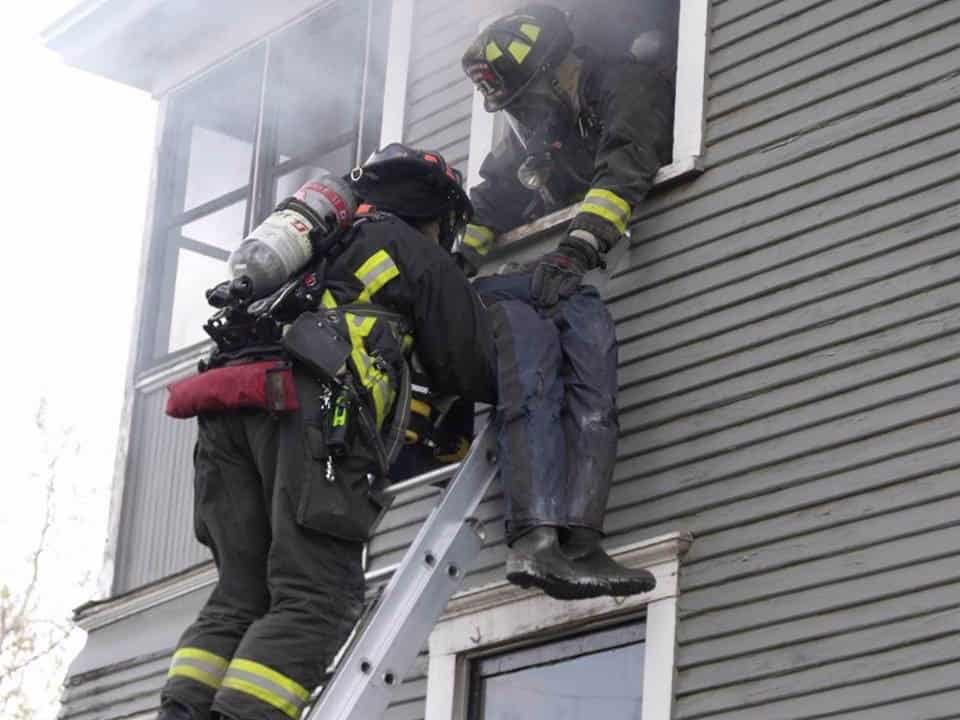
The firefighting profession is extremely serious; here’s a fast breakdown of the 10 Requirements for Becoming a Firefighter to get you ready to join the fire service. Becoming a firefighter is no simple task. It requires difficult work, extended periods of preparation and training, devotion and an earnest craving to help other people.
The firefighter testing process is serious, as well. You’ll be facing hundreds of candidates applying to one department. The question to ask yourself is how can you stand out and where do you begin?
Here is a breakdown of the 10 firefighter career requirements of what you should do (and shouldn’t do) as you get ready to join the fire service.
10 Firefighter Career Requirements
- 21 years of age.
- Valid driver’s license.
- High school diploma or GED.
- Good physical condition.
- Clean Background check.
- Active in the community, volunteer.
- Successfully complete the testing process.
- Pass a medical exam.
- Pass a psychological exam.
- Graduate from the fire academy.
Make sure you meet all the posted requirements for Firefighter
For most entry level firefighter positions you will need to be 21 years of age and have a valid driver’s license. You will also need to pass a comprehensive background check and a medical evaluation. There could be education requirements as well as medical training requirements. These are some of the standard requirements. What is important for you as the firefighter candidate is that you read to job posting thoroughly and verify that you meet or exceed all the requirements. Read more about the application process my clicking here.
Meet any and all Educational Requirements
At the very least you will be required to have a high school diploma or GED. More and more Fire Departments requiring high education of a 2-year associate degree. Most however, will at the vary least give preference points for higher education but not require it.
You may also be required to be an EMT or paramedic. Having both a fire and EMS foundation will work in your favor giving you preference points if it is not required.
This book has been created to help us all develop or reinforce the mindset required to consistently train so that we can serve our communities at the highest level. This performance level is what we would expect from any firefighter who shows up to one of our own homes.
Good Physical Fitness
A firefighter is required to be in great physical shape. The level of fitness starts at the testing process and is a priority throughout your career. All firefighter hiring processes will require some type of physical fitness test. For this reason you need to come into the process in good physical condition. A common firefighter physical fitness test is the Candidate Physical Ability Test, better known as the CPAT test. This physical fitness test consists of 8 stations consisting of firefighter related steps. It is a timed, pass/fail test. Click here to read my post that focuses on the the CPAT testing process.
The importance of good physical fitness does not stop at the hiring process. Your first major physical challenge after hiring will be the recruit firefighter training academy. Then throughout your career you will be expected to be physically fit in or to do the job as a firefighter. This is why it is very important have a strong focus on fitness throughout your career.
Avoid and Stay Out of Trouble
At a certain point in your life, you have likely done something you’re not proud of. How you’ve learned from your missteps will be significant when applying for a firefighter career. Getting a DUI at 22 and you are now 26 and have not repeated your mistake is a good move in the right direction. Being able to explain how you have learned from your mistakes of the past is also very important.
When these mistakes are brought up during the process, don’t lie. Take ownership of your missteps. Disclose to the recruiting board how you’ve changed and learned from your mistake.
On the off chance that you use Facebook or other web-based media, be aware of what you post, repost, remark on and like. Anticipate that all potential employers will check your online media presence. In cases where there is humiliating, juvenile, racy or any other improper posts on your pages, eliminate them. Request that your friends do the same with any such posts including you from their pages.
Engage in your Community, Volunteer
Volunteering for local charities and events and being an active part of your community may not be a requirement but it is a very important part of your resume and the testing process. Being a Firefighter is by its very nature there for the community. Candidates that demonstrate that they have stepped up in the past and are currently involved in the community they live in will score well in the area. There is a ton of incredible volunteer opportunities out there for you to be apart of. The American Red Cross or Habitat for Humanity are two astounding choices.
The Written test
Study! Furthermore, if all else fails, concentrate and study more. The written test comprises of various decision questions and is separated into classifications. Click here to look over my post on the written testing process.
The Psychological Evaluation
You can’t study for this one. The psychological evaluation process and assessment will take a look at your psychological ability to withstand the burdens related with firefighting in a mental capacity. As a firefighter you are often put in to very stressful situations. You will also see things that can be disturbing and difficult to precess. For this reason the fire service is working very hard to address these challenges by evaluations and support throughout your career.
The Oral Interview Process
Why do you want to be a firefighter? A common question you may hear during your oral interview. The best way to prepare for this part of the process is to practice being in front of an interview panel. Search Google for common questions and really focus on how you will answer those questions in a way that is honest, sincere, and will help you stand out among the other candidates.
I would also strongly suggest you talk some classes on interviewing, presentations and public speaking. All there skills will help you improve for the interview process. Consider joining a group like Toastmasters to improve your public speaking skills.
Here is a post that will help you prepare:
10 Skills for giving a great speech
The Firefighter Interview, Prepare For All Three
Pass the Fire Academy
Most departments will send you, the new recruit, to a 12 to 16 week firefighter training academy. This is a knowledge packed and physically demanding process that will hone you into career firefighters ready for your first day on the rig. This Academy will be pass/fail. Being prepared mentally and physically is a must. But I also want to stress that the department that has hired you wants to see you succeed! The days of washing candidates out “just because” are long over. If you work hard and apply 100% effort you will do fine. Read my post on 9 reasons Firefighter recruits fail the fire academy to help prepare.
You may be considering attending a public fire academy before getting hired. This can be a real plus for you to stand out during the hiring process. If this might interest you, read my post on Public Firefighter Training academy programs.
While fire academies teach the fundamentals and technical skills of firefighting, “life as a rookie” is an area that is mostly overlooked. Three fire service veterans wrote The Station-Ready Rookie to help new firefighters know and understand what will be expected of them during their first assignment to a fire station and throughout their probationary period.
Stay Mentally Tough and Focused.
The testing process is tough but with proper preparation and focus you will succeed. Build good habit and develop goals and an action plan that will get you to your dream of becoming a firefighter.
Good luck to you!


